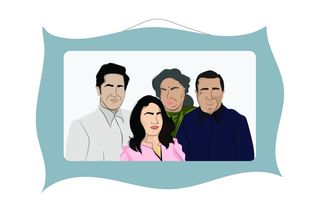
This Is My Family: the Woman Who Remarried but Lives With Her Late Husband’s Parents
“They lost their son. We had lost our parents. The best idea was to stay together as one, small happy family.”

In This Is My Family, we explore alternative family structures and the institution of marriage in India.
I married my boyfriend of six years in a ceremony that I would call my dream. That was, undoubtedly, the happiest day of my life. But I had no idea that it wouldn’t last long. A year later, I was at work, excited to go buy a pup with him in the evening, when my phone rang. It was from my husband’s phone, but it wasn’t his voice on the other line. A man told me my husband was being rushed to the hospital. I remember being numb when a co-worker took over the phone and helped me make sense of the situation. My husband had met with a road accident, for no fault of his. His cabbie was falling asleep while driving. Three days later, he passed. From brain injuries.
I don’t want to go back to the day, but after it happened, I didn’t want to be around anything he was related to. But I also didn’t want to leave his parents alone. He was their only child. We were their happiness and what they’d wait for every evening. I loved his parents. For six years when I dated him, they were so accepting of me and treated me like their own daughter. They were the most welcoming parents I’ve seen and would let me be, treat their home like it was mine even though I wasn’t married then. So, I stayed back with them, and I didn’t have anywhere else to go. I had lost my parents a few years ago. That was also why I loved his parents so much. Concerned for my well-being, they kept asking me to remarry. I kept opposing. More than for anything else, or for the love for my husband, it was because I didn’t want to leave his parents alone. I was their only source of happiness, they’d say. How could I leave them alone? I kept brushing it off, and they’d also keep remembering it and forgetting it.
We went about our lives, working, seeking other ways to entertain ourselves when, two years after my husband’s demise, I found myself talking — a lot — to my childhood friend. We’d lost touch because we were living in different countries, but he had moved and was in Mumbai. We decided to meet, and kept meeting — a lot. We never understood what was happening. A few months passed, and then a year. We hadn’t stopped talking or meeting. We sat down by Marine Drive one day and assessed what was up between us. We talked whether this was a rebound, or was I in this because I’d lost someone and I needed someone to always be around. But we eliminated all those angles.
I came back home and spoke to my mom (in-law), and without any hesitation, she asked me: Would I be okay marrying him? My immediate answer was — and I remember this clearly — “I’m not leaving you alone.” She started crying. She had told me, “If we were talking about my son here, we’d all never be alone.” We cried through the night and slept. The next morning, we spoke to Papa (father-in-law) and discussed it with him. He is very progressive and practical. He told me, “The one who had to go has gone. We need to move on and ensure he sees us happy.” He asked me if I’d be happy with the new man, Manit* (name changed on request). I said yes but also told them about my inhibition about leaving them alone. Papa told me that I will never leave them. They’ll marry me off like they would if they had a daughter. And he asked me to promise to meet them every weekend. It seemed reasonable at that point.
Related on The Swaddle:
What Is the Right Amount of Expectations from a Romantic Partner?
I discussed it with Manit. He dismissed the deal between me and Papa completely — but put forth a new one: He said marriage was an option only if they’d agree to live with us. In my husband’s absence, I was supposed to take care of them, and Manit wanted to ensure that I did it. I remember crying for hours after he had told me this. I was overwhelmed — sad, happy, everything at once. I just didn’t know what was happening to me. I went back home with this proposal — and my parents (in-law) didn’t agree. They said it was absolutely bizarre, that they were perfectly capable of taking care of themselves and that it was completely unacceptable in Indian society. I called Manit over, and it turned into a heated argument that went on through the night. The morning was a lot more peaceful. We tried to talk calmly and make sense of everything. They agreed, only for the sake of their son.
I got married again. With their blessings in tow. I didn’t have to cry this time. My parents were going to live with me. And again, each day has become the happiest day of my life. We live like we always belonged to one family. Manit is their son, and they’ve never made him feel like he’s replaced someone. We go on holidays like one family, and I don’t wish for anything to change. We fight too — they scold Manit like they would their own son; initially, I’d be worried, but Manit has never opposed or felt bad about it. We both lost our parents and can’t count our blessings to have found parents in someone else. We can only hope that they can see their son in us and our happiness.
Many of our relatives have had expressed their reservations about this setup. But you know what? That’s their problem. They weren’t here to see what parents go through when their only child dies. But since I’ve decided to see everything positively, I only hope this sets a precedent and an example for others. There’s nothing more important than being compassionate and caring towards others.
Today, I’m thankful for everything. And happy with my new family. And getting ready to welcome a pup soon.
This interview has been condensed and edited for clarity. As told to Anubhuti Matta.
Anubhuti Matta is an associate editor with The Swaddle. When not at work, she's busy pursuing kathak, reading books on and by women in the Middle East or making dresses out of Indian prints.
Related


Why People Are So Creeped Out by Clowns, According to Science
